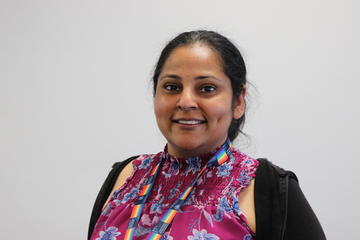
Mili Kalia, EDI manager, NIHR Oxford Biomedical Research Centre
Working together with partners and stakeholders is a cornerstone of our BRC EDI strategy. Our core mission states that we “will engage and partner with BRC Stakeholders to catalyse and strengthen EDI activities”.
This was one of the reasons I applied for the position of Oxford BRC’s EDI manager in March 2024. A year on, I would like to share some of my reflections on how we are bringing this to life with the help of our EDI coordinators.
They are playing an important role in the BRC, ensuring diverse voices, experiences and expertise are considered from the start – a crucial step in delivering relevant, impactful and transformative healthcare research interventions.
Who are the EDI coordinators?
The EDI coordinators are a group of vibrant and experienced representatives from each of the 15 BRC research themes. We meet quarterly, sharing and disseminating EDI-related information and resources.
Collectively, we identify areas of change and improvement, constantly learning and growing.
As Dr Lorna Henderson, the Oxford BRC’s EDI lead, who established the EDI coordinators group in 2023, notes, this vital group who help not only disseminate information on the importance of EDI but “catalyse our efforts to meet the NIHR objectives of embedding EDI at the heart of the BRC”.
Strengthen EDI activities
We know that our key partners – Oxford University Hospitals, University of Oxford departments, as well as other parts of the NIHR infrastructure – play a critical role in supporting us to embed EDI. However, this is not an easy task as there may be competing priorities or lack of clarity in how resources are distributed.
Through sharing their knowledge, connections and lived experiences, our coordinators have helped me appreciate, navigate and join up the complex and diverse partnership landscape.
They are experts in research delivery and have been instrumental in highlighting EDI needs and the issues the research themes are grappling with, how they are problem solving and sharing best practices. These include topics such as training needs, challenges around effective communications, the importance of understanding the role of research culture, which can differ greatly in each theme.
They are also our critical friends, shaping and guiding our efforts. This in turn is helping us catalyse key EDI activities.
EDI training needs
Late last year, I had the pleasure of hosting a hybrid workshop on the hierarchy of training and knowledge needs with our coordinators. We used an interactive whiteboard to map high-impact and high-need training modules that the Oxford BRC could offer.
These conversations have led to the BRC offering Lunch and Learn sessions, provided by EDI experts from our partner organisations.
On reflection, this interactive workshop proved to be a useful learning moment in how collaboration can engender innovation. There are pitfalls in working in a silo and we wrongly assumed what people’s training needs would be. In contrast, the coordinators opted for a set of interventions that were novel, demonstrating a desire to learn something new and a real growth mindset.
EDI at the Oxford BRC is greater than the sum of its parts; the skill and experience that our coordinators bring to the table are immeasurably helping to shape our direction of travel. Credit goes to them for their hard work, generosity and candid input.
To echo the words of Alexander Graham Bell, “Great discoveries and improvements invariably involve the cooperation of many minds. I may be given credit for having blazed the trail, but when I look at the subsequent developments, I feel the credit is due to others rather than myself.”